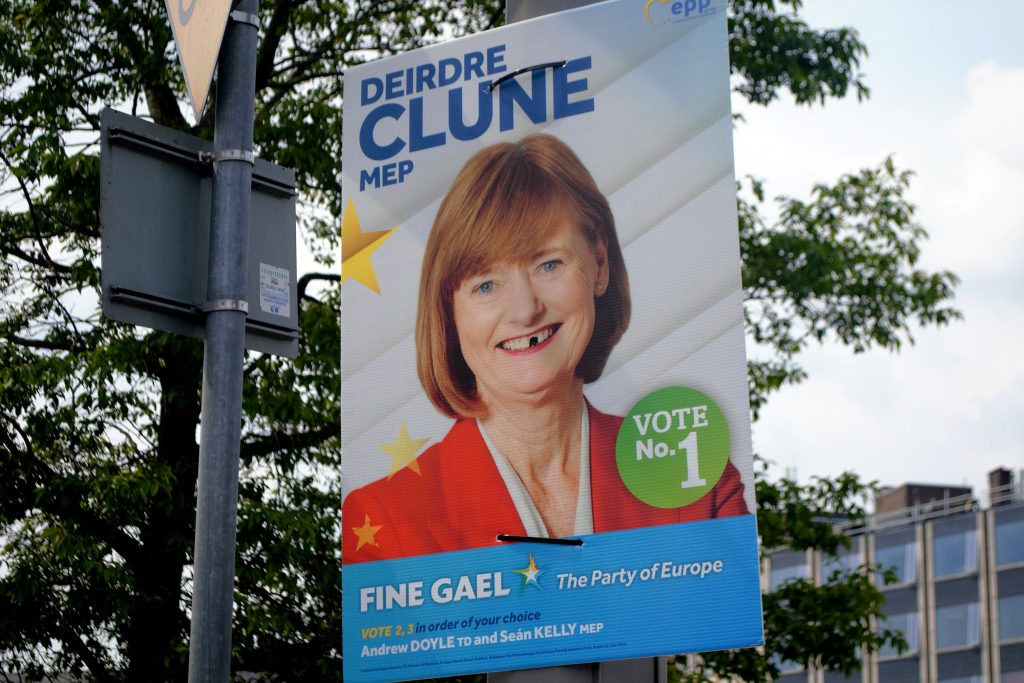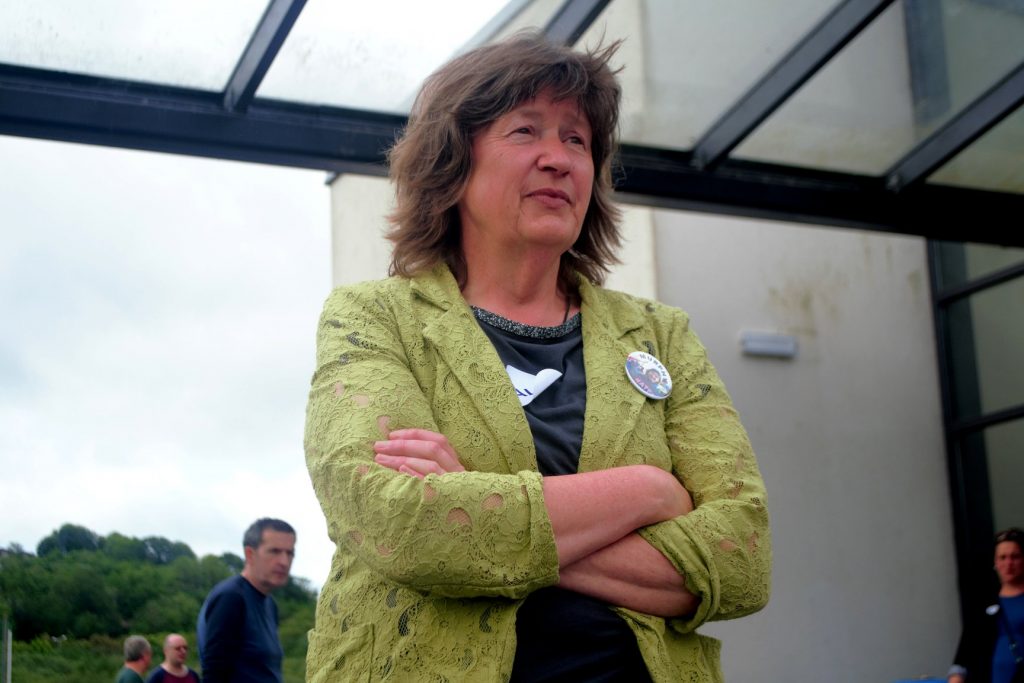Election posters: reuse, recycling or a total rethink?

June 5th, 2019
After 30 days out on display, election posters came down last Friday as political teams scrambled to remove cable ties and candidate portraits from lampposts and electricity poles across the urban and rural landscape.
There is a rising public chorus against posters, however, due to their potential impact on the environment if improperly collected, as well as the emissions generated in creating them.
In 2014, just over 2,000 candidates ran for 750 seats in the local elections, erecting over 600,000 posters. Most posters are made out of corrugated plastic that, if not reused or recycled, will stick around for up to 400 years.
Aside from environmental and climate concerns, promotional posters are also disliked over concerns that they can pose a threat to public safety by covering road signage and sometimes forcing cyclists out of cycle lanes.
Not everyone supports the call for a ban. Dr Theresa Reidy, a political scientist at University College Cork (UCC) said in a recent op-ed that the anti-poster sentiment is “ill-informed and misguided” as many voters don’t have multiple sources of political information.
She does, however, recognise that there is a “legitimate discussion” to be had around the environmental cost of election posters and looking at alternatives such as designated spaces where posters are displayed.
However you feel about the posters, they certainly made media waves this year, hitting the headlines in Cork for example as defacing them became a leitmotif of the local elections.
The graffiti may point to public’s dissatisfaction with the publicity push in the city, but it is not only the public who are getting fed up with posters and the power they hold over the electoral process.

Not a single poster
Independent Cork City councillor Kieran McCarthy reclaimed his seat earlier this month without erecting a single promotional poster.
The eco-conscious choice, he says, prompted him to lead a more vigorous campaign and engage with the electorate one-on-one.
“I knew it was going to be very tough, but I’m glad I did it because it helped me to focus on canvassing and knock on as many doors as I could,” he says.
McCarthy, a historian by trade whose latest book is a tribute to Cork’s harbour, says he could not bear the idea of ruining the city’s aesthetic quality with posters.
“I’ve been saying this for years that we need to mind our local area,” he says. “So, I had several reasons [but] of course the environment was a reason because we know that plastic is a huge issue.”
McCarthy says that while he became apprehensive about his choice at times, erecting posters would have contradicted his core ethos of “minding” the city. “A lot of people contacted me saying, ‘Are you running in the local elections? We don’t see any posters,’” he recalls.
“But I went to my mantra, and I went to my heart as well a little bit, and I just couldn’t do it,” he says, glad that his “track record” during his time in the Council “spoke for itself” so that he didn’t have to carry the weight of contributing to climate change on his conscious.
While a voluntary ban on election posters was in place in over 150 towns across the country owing to a national voluntaryposter free campaign, McCarthy thinks more compulsory measures need to be in place.
“Candidates should be banned from putting up posters of themselves 10 poles in a row. I think it insults the intelligence of voters,” he says.
A Reused campaign
While not running poster-free, close scrutiny of posters from the Lord Mayor of Cork City Mick Finn shows that he put noticeably slimmer posters on display.
The Independent politician, who was successfully returned for another five-year term, told The Green News that his lean posters were modified and “reused from the general election”.
“I had older posters which I reused because I didn’t particularly want to purchase more which would require extra recycling,” he says.
Mr Finn, however, believes that a ban on posters needs to be implemented from the top down and transcend local authorities’ ambit of influence.
“[A mandatory ban] needs to come from [the] Government and should not be left to individual councils,” he says.

A poster-free environmental fight
While some argue that poster-free campaigns can only work for the likes of McCarthy or Finn who are already well known, Noreen Murphy put this concept to the test.
The first time independent candidate and environmental campaigner won over 1,000 voters (ultimately eliminated on the eight count) without street posters through her canvassing flurry over the last two weeks of the campaign.
Murphy, a Ballyvolane native, relentlessly campaigned for the closure of a large rubbish dump in the area, an environmental victory that may have had an influence more potent than publicity posters.
Murphy told The Green News that candidates should feel uneasy about erecting posters that would pollute the environment knowing that the “taxpayers are paying for their disposal”.
“Posters can be reused over and over again, but we are paying so that they can be put in a landfill,” she says, encouraging people to make novel use of posters for the likes of raised beds.
Recycling not enough
Waste collection company Panda recently called on the politicians to collect and bring their posters to them, promising to recycle the material for free.
Environmental scientist, Cara Augustenborg, however, took to Twitter to outline her lack of optimism about the idea of recycling election posters.
Describing recycling as a “waste of resources”, Ms Augustenborg tweeted that posters have become instruments of “keeping big players in” and locking out new candidates.
Augustenborg added that she “reluctantly” printed 100 posters for her run in the 2014 local elections with the Green Party as it was the only way to inform her constituency of her candidacy at the time.
She tweeted that she would have much preferred a centralised poster point like in Belgium and France “where all candidates have one small poster” or voter guides provided by Councils as a solution to ensure the safety of both the environment and the democratic process.

Mission poster collection
Edward Fitzgerald and Tjitske de Vries – both of People Before Profit – recently documented their poster collection journey on Facebook, fruitfully collecting their posters from across the city to reuse for future elections.
Fitzgerald told The Green News that, as a “green-focused” candidate, gathering up his election waste was a priority. “As candidates and activists, we wanted to collect our posters and reuse them again to minimise our impact on the environment,” he says.
De Vries, who says a number of her posters were “stolen” during the election season, adds that the cable ties used to fasten posters to poles also need to be collected.
“We wanted to make sure that all the cable ties came off as well,” she says. “The cable ties are going to make little basket for our garden.”
Both candidates would like to see a comprehensive ban on election posters as well as a limit on the level of funding that candidates can spend to promote themselves during the election season.
For now, they will continue to reuse any material, with Fitzgerald joking that he is more than happy to have his posters down and to no longer be “stalked” by himself across the city, at least for another five years.
[x_author title=”About the Author”]







